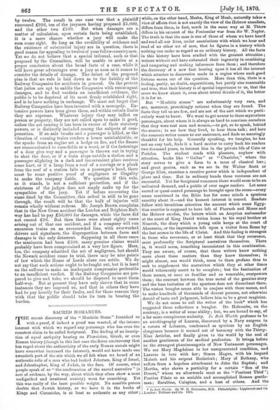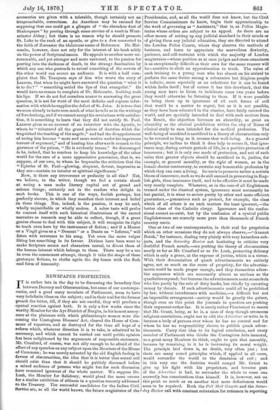SACRED ROMANCES.
while, on the other hand, Mesha, King of Moab, naturally takes a view of affairs that is not exactly the view of the Hebrew annalists, differs from them, in fact, much in the same way as M. Thiers
differs in his aeoonnt of the Peninsular war from Sir W. Napier. The truth is that the man is one of those of whom we have heard and read all our lives, under associations with which we hear and read of no other set of men, that he figures in a history which nothing can make us regard as an ordinary history. All the facts in this history have been studied with the greatest attention ; writers without end have exhausted their ingenuity in combining and comparing and makirig inferences from them ; and therefore the discovery of a new fact bearing upon it has all the interest which attaches to discoveries made in a region where such good fortune seems out of the question. More than this, there is a feeling, partly, no doubt, superstitious, but partly also reasonable and true, that their history is of special importance to us, that the more we know about it, even about trivial details of it, the better it is for us.
But " Moabitic stones" are unfortunately very rare, and are, moreover, provokingly reticent when they are found. The facts they tell us are few, and are not of the sort which we parti- cularly want to know. We want to get nearer to these mysterious personages, about whom it is always so hard to convince ourselves that they were real men and women,—to get, so to speak, behind the scenes ; to see how they lived, to hear them talk ; and here the romance writer comes to our assistance, and finds us amazingly thankful for his help. Generally speaking, we imagine, he has not an easy task, finds it a hard matter to carry back his readers two thousand years, to interest him in the private life of Cato or Pericles. The student reads with pleasure, anyhow with attention, books like " Gallus" or " Charicles," where the story serves to give a form to a mass of classical lore ; and great genius, such as we see in Sir Walter Scott or George Eliot, exercises a creative power which is independent of place and time. But in ordinary hands these ventures are not successful. Yet for Scriptural romances there would seem to be an unlimited demand, and a public of ever eager readers. Let some sacred or quasi-sacred personage be brought upon the scene—every name mentioned in the Bible has for some minds a spurious sanctity about it—and the keenest interest is roused. Readers follow with breathless attention the account which some Egyp- tian courtier is supposed to have left of Pharaoh and Moses and the Hebrew exodus, the letters which an Assyrian ambassador at the court of King David writes home to his royal brother at Nineveh, the diary which a young exile keeps at the court of Ahasuerus, or the impressions left upon a visitor from Rome by the last scenes in the life of Christ. And this feeling is strongest in those who reverence, or at least think that they reverence, most profoundly the Scriptural narratives themselves. There is, it would seem, something inconsistent in this combination.
They are aware, of course, that these writers know nothing more about these matters than they know themselves; it might almost, one would think, seem to them profane thus to seek to supplement the narratives which they at other times would vehemently assert to be complete ; but the fascination of these names, at once so familiar and so venerable, overpowers them ; the contrast between the true metal of the genuine story and the base imitation of the spurious does not disenchant them. The veriest bungler seems able to conjure with these names, and to make hundreds of thousands of devout persons, not otherwise devoid of taste and judgment, believe him to be a great magician. We do not mean to call the writer of the book* which has suggested these reflections a bungler. Dr. Holcombe, on the
contrary, is a writer of some ability ; but, we are bound to say, of a far more conspicuous audacity. In Both Worlds professes to be an autobiography of Lazarus, discovered by a Navy surgeon in a cavern of Lebanon, condemned as spurious by an English clergyman because it seemed out of harmony with the Thirty-
Nine Articles, and finally given to the world by the zeal of another gentleman of the medical profession. It brings before us the strangest phantasmagoria of New Testament personages.
We see Mary Magdalene in her unregenerated condition, and Lazarus in love with her ; Simon Magus, with his leopard Moloch and his serpent Beelzebub ; Mary of Bethany, who suffers from a hopeless attachment to John the Baptist; and Martha, who shows a partiality for a certain " Son of the Desert," whom we afterwards meet as the "Penitent Thief "; Pontius Pilate as an amiable and accomplished Roman gentle- man ; Barabbas, Caiaphas, and a host of others. And the
* In Bolls Worlds. By W. H. Holcombe, N.D. Philadelphia : Lippincott and Co London: Triibner and Co. 1870. accessories are given with a tolerable, though certainly not an irreproachable, correctness. An American may be excused for supposing that one could get a glimpse of " the shrunken dust of Shakespeare" by peering through some crevice of a vault in West- minster Abbey ; but there is no reason why he should promote St. Luke to the rank of an apostle, or give to a Jew converted to the faith of Zoroaster the idolatrous name of Beltrezzor. Dr. Hol- eombe, however, does not rely for the interest of his book solely on the power of Scriptural names. He appeals to another more un- reasonable, and yet stronger and more universal, to the passion for peering into the darkness of death, to the strange fascination by which any one who pretends to reveal something of the secrets of the other world can secure an audience. It is with a half com- plaint that Mr. Tennyson says of him who wrote the story of Lazarus, that when he might have answered the question " what it is to die?" "something sealed the lips of that evangelist." He would have no reason to complain of Dr. Holcombe. Nothing seals his lips. If we do not feel ourselves nearer to answering the great question, it is not for want of the most definite and copious infor- mation with which he supplies the defect of St. John. It is true that we seem already to have seen much of what he tells us in the writings of Swedenborg, and if we cannot accept his revelations with satisfac- tion, it is something to learn that they did not satisfy St. Paul. Lazarus gives us an account of an interview with the Apostle, to whom he " reiterated all the grand points of doctrine which dis- tinguished the teaching of the angels ;" and had the disappointment of seeing him become " more and more restive under his impetuous torrent of argument," and of hearing him afterwards remark to the governor of the prison, " He is evidently insane." So discouraged is he, indeed, that he resolves to keep his knowledge of the other world for the ears of a more appreciative generation, that is, we suppose, of our own, to whom he bequeaths the criticism that the 4' Epistles of St. Paul—glowing, eloquent, devout, impressive as they are—contain no interior or spiritual significance."
Now, is there any irreverence or profanity in all this? Not, we believe, in the writer, though we feel a certain shock at seeing a man make literary capital out of grand and solemn things ; certainly not in the readers who delight in such books. This is one of the ways, foolish perhaps, but perfectly sincere, in which they manifest their interest and belief in these things. Nor, indeed, is the passion, it may be said, wholly unjustifiable or wholly useless. A sober taste will prefer to content itself with such historical illustrations of the sacred narrative as research may be able to collect, though, if a great genius choose to deal with this subject, it will recognize its right to teach even here by the instrument of fiction ; and if a Homer or a Virgil gives us a " Descent " or a Dante an " Inferno," will listen with reverence to his song. Yet even the more vulgar liking has something in its favour. Divines have been wont to make Scripture scenes and characters unreal, to divest them of the human interest which belongs to them. There may be a use in even the commonest attempt, though it take the shape of these grotesque fictions, to clothe again the dry bones with the flesh and form of humanity.































 Previous page
Previous page